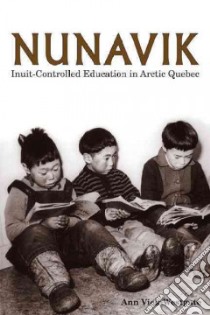Nunavik - 9781552380567
Un libro in lingua di Vick Ann Westgate edito da Michigan State Univ Pr, 2002
- € 31.90
- Il prezzo è variabile in funzione del cambio della valuta d’origine
?In the pages of this book, you will read of the efforts of many to fearlessly audit the state of education in Nunavik. To diligently seek improvement of an already good system. To fix what is not necessarily broken so that those who come after us will have it even better than we did. The various tensions and differences of opinion are, to me, not contentious at all. The status quo, however good or excellent, is no place to stay. I think all recognize this.” -- Zebedee Nungak, from the Foreword As a history of the development of self-government in education, Nunavik provides Native perspectives on formal education in Nunavik while offering readers a unique view into contemporary Inuit society. This book documents the development of education from the arrival of the first traders and missionaries in the mid-nineteenth century through the creation of the Kativik School Board and the evaluation of its operations by the Nunavik Education Task Force in the 1990s. Nunavik takes a detailed look at the complex debate of the Inuit of Northern Quebec about the purposes, achievements, and failures of the public schools in their communities, the first Inuit-controlled school district in Canada. Participants in these debates included elders who were educated traditionally, their children with a few years of education in mission and government schools, their grandchildren who attended southern high schools or residential schools, and current students and recent graduates of the Kativik schools. Qallunaat (non-Inuit) were also participants, as residents of Nunavik communities, parents of Inuit children, teachers, administrators, and expert consultants. Illustrated with rich historical photographs, in colour and black and white, and maps from the collections of the Avataq Cultural Institute and the Makivik Corporation, Nunavik provides a uniquely Native perspective on school change in indigenous communities.
Informazioni bibliografiche
- Titolo del Libro in lingua: Nunavik
- Sottotitolo: Inuit Controlled Education in Arctic Quebec
- Lingua: English
- Autori : Vick Ann Westgate
- Editore: Michigan State Univ Pr
- Collana: Michigan State Univ Pr (Hardcover)
- Data di Pubblicazione: 01 Settembre '02
- Genere: EDUCATION
- Argomenti : Inuit Education QuGebec (Province) Nunavik Education QuGebec (Province) Nunavik Inuit GEducation QuGebec (Province) Nunavik
- Pagine: 416
- Dimensioni mm: 234 x 165 x 25
- ISBN-10: 1552380564
- EAN-13: 9781552380567


